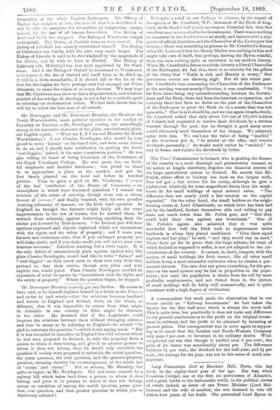It is quite a relief to our feelings to observe,
by the report of the speech of Mr. Crawford, M.P., Governor of the Bauk of Eng- land, at the Bank's half-yearly meeting on Thursday last, that that excellent man is reconciled to the Government. There was something so unnatural in the fetid between so steady and immemorial a sup- porter of official liberalism and the Chancellor of the Exchequer last session,—there was something so piteous in Mr. Crawford's dismay when Mr. Lowe said that the Money Market was nothing to him and might take care of itself, that perhaps, barring the Byron scandal, there has been nothing quite as unnatural in our modern history. When Mr. Crawford is driven to rebuke bitterly a liberal Chancellor of the Exchequer, we feel that there is no security for the pillars of the State, that " Earth is sick and Heaven is weary," that portentous events are drawing nigh. But all this seems past. Mr. Crawford's tone concerning the Chancellor of the Exchequer at the meeting was not merely Christian, it was comfortable. " So far from there being any misunderstanding between the Govern- ment and the Bank, there had been the heartiest co-operation, and certainly there had been no desire on the part of the Chancellor of the Exchequer to press the Bank on to a course that was not agreeable." That is as it should be, and we can again breathe freely. Mr. Crawford added that only about 700 out of 120,000 holders of Consols had requested to receive their dividends by a written warrant through the post, but he thought a good many more would ultimately avail themselves of the change. We certainly agree with him. We can't see the value of being " enabled " as the Governor put it, " to attend at the office and receive dividends personally ;" we would much rather be " enabled " to stay at home, and receive the dividends by letter.






























 Previous page
Previous page